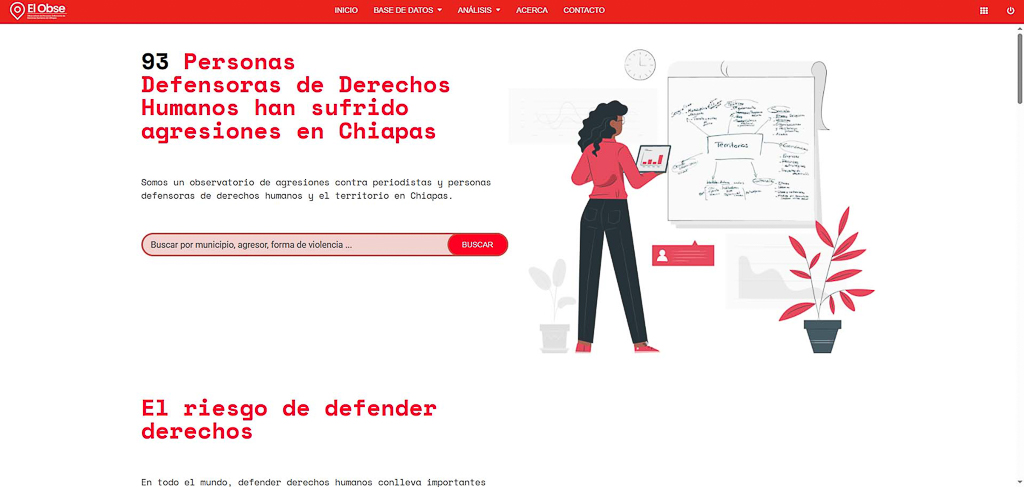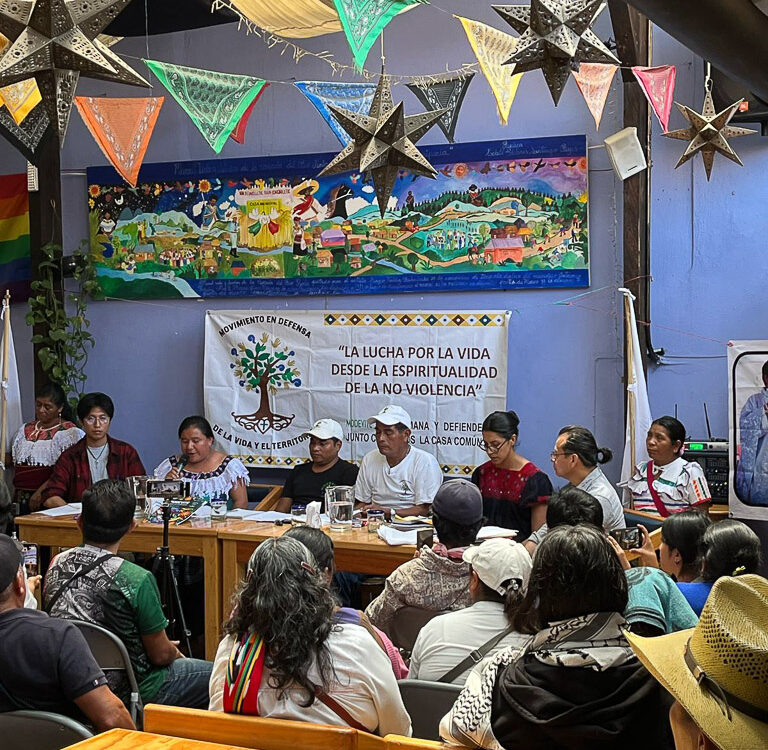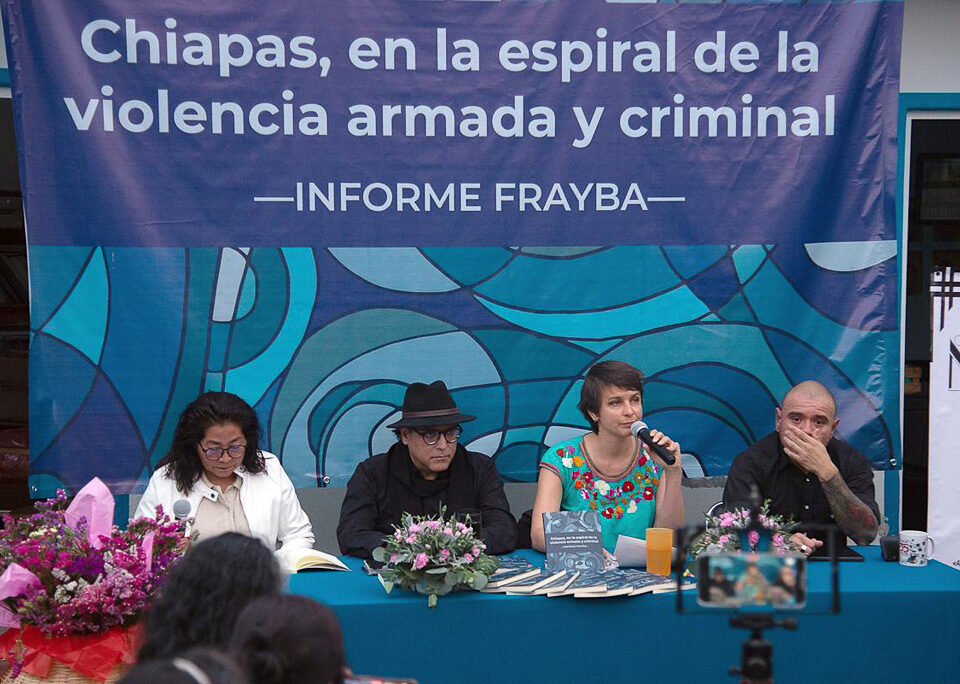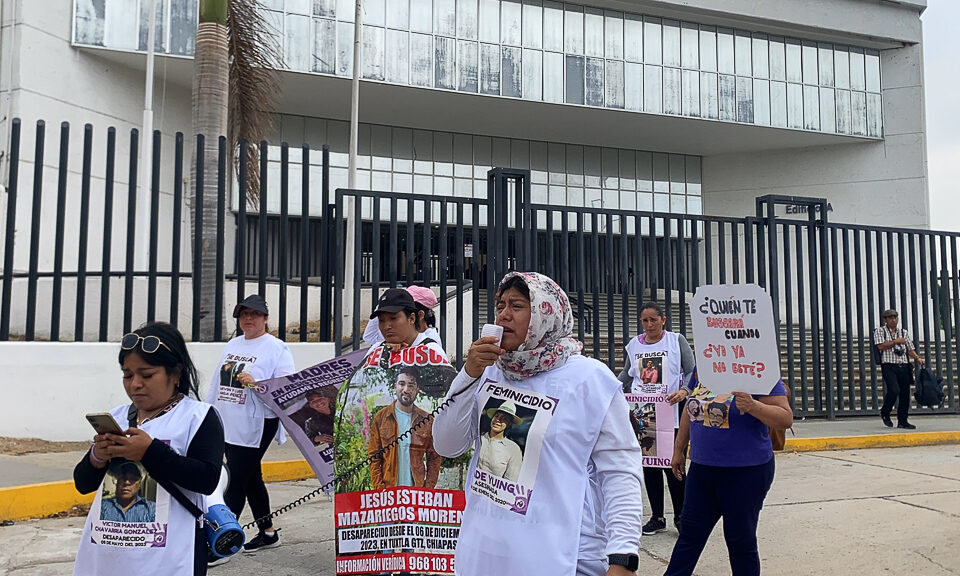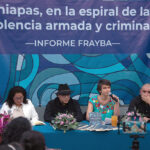
FOCUS: “Chiapas in the Spiral of Armed and Criminal Violence”
11/06/2025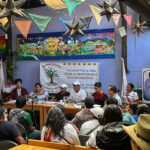
SIPAZ Activities (Mid-February to Mid-May 2025)
11/06/2025
T he situation in Chiapas presents a panorama marked by serious human rights violations. In recent years, the state has experienced an alarming increase in forced displacement, disappearances, the presence of armed groups, drug and human trafficking, and political violence.
Although the government of Eduardo Ramírez Aguilar (ERA) presented Chiapas as “the second safest state in the country” upon completing his first 100 days in office, many residents live a different reality. With the new security strategy, of which the Pakal Immediate Reaction Force (FRIP) is a centerpiece, some progress has been made, such as the reduction of armed confrontations, the discovery of clandestine graves, the lifting of roadblocks, and the arrest of suspected drug traffickers. However, doubts persist due to the lack of arrests of criminal leaders and the absence of legal action against former governor Rutilio Escandón and other former officials responsible for security. Furthermore, human rights violations have been documented during the operations, including reports of arbitrary detentions and torture by the FRIP.
Faced with this situation, those fighting against these violations and defending justice, equality, and peace are human rights defenders, such as activists, members of civil society organizations, journalists, collectives, organized communities, and priests. According to the United Nations (UN), human rights defenders protect diverse rights such as: “[…] the right to life, food and water, the highest attainable standard of health, adequate housing, a name and nationality, education, freedom of movement and non-discrimination, […] the rights of women, children, indigenous peoples, refugees and internally displaced persons, and of national, linguistic, or sexual minorities.”
Dedicating oneself to the defense of human rights in contexts of violence entails high risk. The TDT Network documented 92 extrajudicial executions of human rights defenders during the six-year term of former President Andrés Manuel López Obrador. “[…] the majority of these cases occurred primarily in Oaxaca, followed by Chiapas. Most of the victims were involved in the defense of land and territory, the environment, and the self-determination of Indigenous peoples.”
Faced with this reality, civil society organizations in Chiapas decided to create a tool to document, make visible, and systematize these attacks: the Chiapas Observatory of Human Rights Defenders (El Obse). It is a platform promoted by 20 organizations working from different regions of the state. These organizations include the Fray Bartolomé de las Casas Human Rights Center, Fray Matías, Fray Ignacio Barona, and Digna Ochoa, as well as Tsomanotik, Colibres, Enlace, IMDEC, SERAPAZ, SIPAZ, Sursiendo, Swefor, Tzome Ixuk, and Voces Mesoamericanas.
The collaboration between these organizations began in 2023 with training processes and exchange meetings, until the platform was launched on March 7th, 2025, with a public event in San Cristóbal de Las Casas.
Since January 2024, El Obse has recorded 107 violent acts committed against human rights defenders. In addition to monitoring the most frequent attacks, its website offers information on the profile of those attacked—such as their gender, occupation, and the rights they defend—as well as a geographic mapping of the most affected municipalities, among other things.
Data collection and validation are carried out carefully to ensure the safety of those attacked. Only when cases do not pose additional risks to human rights defenders are they published online in an accessible and georeferenced manner.
During the launch event, Ximena Ramos, representative of the Office of the United Nations High Commissioner for Human Rights in Mexico, highlighted the work of human rights defenders in high-risk contexts such as Chiapas, underscoring the Mexican State’s responsibility to guarantee their protection and safety, in compliance with international human rights commitments.
In its first report, El Obse warned that 2024 has been the most violent year of the electoral process in Mexico, particularly in Chiapas. It noted that 15 people linked to the political process were murdered in the state and 515 resigned their candidacies due to fear of violence. Furthermore, 108 polling stations could not be set up for security reasons.
The violence has also forced the forced displacement of at least 2,300 people, primarily from the municipalities of Chicomuselo, Socoltenango, and La Concordia. Regarding disappearances, 568 people were reported missing in 2024, compared to 320 in 2023, representing a 77% increase. This trend has been increasing since 2020 and continues to be minimized or ignored by authorities.
El Obse has identified various forms of aggression aimed at hindering the work of human rights defenders: intimidation, surveillance, defamation, threats, extortion, abuse of authority, physical attacks, and even murder. Of the total attacks recorded, 70% occurred physically and 32% online, reflecting how the defense of rights—especially those related to land, territory, and justice—has become a high-risk activity.
Among those attacked are primarily members of civil society organizations (69%), followed by independent activists, journalists, community and religious leaders. The main aggressors are unidentified actors, although government institutions, security forces, and organized crime groups have also been identified.
At least four defenders have been murdered in 2024, including Father Marcelo Pérez Pérez, who was killed on October 20th in San Cristóbal de Las Casas. Recognized for his work as a Tsotsil Mayan priest, Father Marcelo was a leading figure in peacebuilding, the defense of land and territory, and peaceful civil resistance against violence.
The Obse report also highlights trends and concerns: the expansion of megaprojects and their associated socio-environmental conflicts; the rise in gender-based violence; more restrictive immigration policies; human rights violations against migrants; the militarization of the territory; the use of surveillance technologies by both the State and criminal groups; the criminalization of social protest; and the stigmatization of youth, particularly Indigenous peoples. Added to this are forced displacement without dignified conditions of return, attacks on journalists, and persistent impunity for violations committed by security forces.
El Obse represents a collective effort to articulate a response to the growing violence in Chiapas. It arises from the urgent need to make visible the attacks against human rights defenders, in a context where silence and impunity prevail.
The platform is a tool for protection and memory, built by organizations that face risks daily for their work. Its existence reinforces the right to defend rights and contributes to strengthening collective memory.
In the article “The Chiapas Observatory: A Community Documentation Response to Violence,” the organization HURIDOCS, which contributed to the development of the platform, highlights: “The development of El Obse demonstrates the fundamental role of collaboration and collective action in addressing the unique challenges faced by human rights and territorial defenders in Chiapas. Through ongoing partnerships and capacity building in documentation practices, the project will continue to evolve to respond to the specific needs of those on the ground.”

